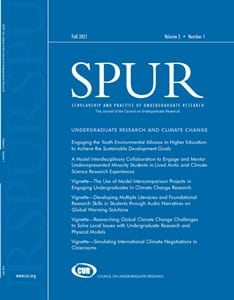SPUR (2021) 5 (1): https://doi.org/10.18833/spur/5/1/11
Few studies have investigated the effects of combining undergraduate research with study abroad. The authors present student self-reported learning gains from two undergraduate courses that embed research within study abroad courses. Students in one course worked in small groups on original research projects; students in the second course collectively contributed to one ongoing, professional research project. Student learning was evaluated through focus groups, reflective journaling, and surveys. Students from both courses reported gains unique to research in an international context, including curiosity inspired by novel environments and valuing local knowledge for site-specific questions. Differences in student learning between courses raise questions about the relationship of course structures to high-impact practices and their potential to affect learning in opposing or synergistic ways.
More Articles in this Issue
No posts found


